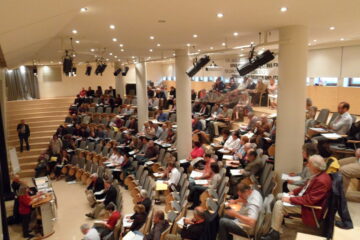
International Day of Free Thought
20th September 2014
Declaration of the National Federation of Free Thought (FNLP), France
Friends, citizens, companions, comrades,
I bring you fraternal greetings from the National Federation of Free Thought and the International Association of Free Thought (IAFT).
It was at the IInd IAFT Congress at Mar del Plata, Argentina, that it was decided to declare September 20th the International Day of Free Thought on every continent. That date is particularly dear to the hearts of our Latin American freethinking comrades. There are many 20th of September associations of in South America.
These associations thus honour the work of Giuseppe Garibaldi, dubbed the hero of two worlds. Freethought has long associated two great figures with the struggle for universal emancipation: Simon Bolivar and Giuseppe Garibaldi.
They have much in common. Simon Bolivar fought throughout his entire dangerous and picturesque life for the independence of South America countries, for republicanism and for the emancipation of the oppressed. In Peru, he succeeded in prohibiting forced labour, freed slaves who had fought for the country’s liberation and obtained a decree that all descendants of slaves would remain free.
It is significant that history will remember him as “the Liberator.” He promoted national, political, cultural and religious liberation, with a fundamentally secular approach.
Giuseppe Garibaldi was 13 when Simon Bolivar died. Later, he joined the “Young Italy” movement of Mazzini whose goal was to transform Italy into a democratic and unified republic.
He also fought in most countries of Latin America, where the red shirts of his fighters became popular and symbolic. Red because, if stained by blood, it would be less visible. Red because it is the colour preferred by rebels and revolutionaries. He crossed the entire continent with the members his brigade, fighting for the liberation of various countries, often taking the same path as Bolivar.
And he fought intensely in Italy for the unification of the country and for the Republic. He was a secularist, of course, because he was fundamentally and fiercely anticlerical. Garibaldi will participate as combattant in the Three wars for Italian independence. On the 8th of February 1849, the Republic was proclaimed in Rome. Garibaldi was there.
He will lead the Expedition of the Thousand in Sicily in 1861, a great success which concluded with a plebiscite that brought Naples and Sicily into the Kingdom of Sardinia, the last territorial conquest before the creation of the Kingdom of Italy on the 17th of March 1861.
So, after the landing of the Thousand at Marsala and his proclamation as dictator (in the ancient sense of the term, i.e, defender of the Republic) in the name of Victor Emmanuel II, Garibaldi promised reform of latifundia and elimination of land taxes. These promises attracted large numbers of farmers to the ranks and facilitated his victory in Calatafimi and the continuation of his campaign into the North. On behalf of Garibaldi, peasants invaded the strongholds of landowning barons and communal lands. Mazzini, for his part, proposed the establishment of a Constituent Assembly to legalize the ownership of the occupied lands. (1)
Finally, on the 20th of September 1870, Rome was incorporated into Italy. Italian troops entered the papal enclave via the Porta Pia. This marked the end of the Papal States. The priests were thus confined, as Karl Marx famously expressed it, to the solitude of prayer. Garibaldi’s dream was finally fulfilled.
The Papal States represented one-third of Italy. By unifying Italy and ending the temporal power of the Pope, Italians accomplished what the French revolutionaries had done in 1790 when they nationalized church property and endowments, which had also represented one third of France. The Vatican, a pseudo-”state” but really supranational, has always opposed the rise of nation-states.
Also noteworthy is the profoundly internationalist character of the action of Giuseppe Garibaldi. For this, he had the unwavering support of Karl Marx and Friedrich Engels. Garibaldi supported the Polish revolt against the Russian Empire in 1863. Recall that it was in Saint-Martin-Hall in London on September 28th 1864, at a rally in support of the Irish and Polish peoples, that the International Workers’ Association – the First International – was founded.
At the beginning of the Civil War in the United States, Abraham Lincoln asked Garibaldi to come fight for him, to be the “Washington of Italy.” Garibaldi accepted on the condition that Lincoln pass a declaration of total emancipation of the slaves. Lincoln refused at that time, but he met that condition in 1865 at the end of the civil war by adopting the 13th Constitutional Amendment. By 1862 Garibaldi was already eager to fight with the Union army, but being injured he was unable to do so. However, a Garibaldi Regiment, the 39th Infantry from New York, was formed in April-May of 1861 under the command of another “Forty-eighter,” the Hungarian colonel Frédéric D’Utassy, and a flag, carried by Garibaldi himself in the campaigns of 1848-1849, was presented to the regiment that fought hard at Gettysburg in 1863.
Garibaldi fought in France during the Franco-Prussian War in 1870 and was even elected to the National Assembly alongside Louis Blanc, Léon Gambetta and Victor Hugo. What a podium! When his election was refused, Victor Hugo resigned from the National Assembly. The Commune of Paris requested his participation, but he refused to become involved in French affairs, he who had fought so hard for the unity of his own country, Italy.
When he died on the 2nd of June 1881, Victor Hugo wrote: “Neither Italy nor France is in mourning. Rather, humanity is.”
The two actions which really inspired Italian and Latin American revolutionaries were those of Simon Bolivar and Giuseppe Garibaldi. Both committed themselves to political emancipation struggles, to cut the ties which held their peoples under the domination of foreign powers. Both worked to unify those whom they emancipated. Both promoted republican and democratic ideas and the secularization of the state and, within the limitations of the their era, worked for social and economic reform. Both emancipators came to pathetic ends once they had completed their epic battles, for in both cases reactionary forces sabotaged their political and social project. (2)
After this page of history,
it is time to draw parallels with the situation today
To celebrate September 20th as the International Day of Free Thought is to assert our will to fight against all forms of supranational oppression which threaten the existence of nation states. It is to assert that supranationalism is contrary to internationalism, which assumes the existence of nations, while supranationalism requires their disappearance. It is also necessary to affirm the emancipation of the French nation from the conduct and directives of the European Union which threaten its full sovereignty and its people’s democratic and social rights and gains.
At a time when countries like Palestine, Syria and Libya are dislocated by the will of the IMF, the World Bank, the United States and the European Union, to celebrate September 20th is to fight against global police whose intent is to impose their dictates and wishes on all peoples. For today, it is against peoples’ right of self-determination that the United States and its lackeys wish to impose their right to dispose of those peoples.
To celebrate September 20th is also to deny attempts to pit citizen against citizen using the European Charter for Regional or Minority Languages by establishing differing rights depending on the use or not of a regional language, because such fragmentation would mean the collapse of the Republic and the creation of different rights in different regions.
To celebrate September 20th is to defend the work of the revolutions that emancipated politically unified people, as did the Great French Revolution, in the words of Peter Kropotkin, the Russian revolutionary. It is also to salute the advent of the First Republic proclaimed in France on 21st and 22nd September 1792, almost exactly 78 years earlier. A watershed event for freethinkers throughout the world!
It is to deny that a religion, Catholicism, should have the privilege of imposing its dogmas on Republics, peoples and nations. It is to state clearly that the 14 Catholic concordats which still plague Europe are feudal remnants of the Papal States. In Alsace-Moselle, in our country, not all citizens are equal with respect to freedom of conscience. Recognized religions are subsidized up to an annual amount of 58 million euros.
Freedom of conscience requires that public funds not be used to discriminate between citizens by the anti-secular use of public funds. Equality of citizens’ rights requires that the law of separation of Church and State adopted on December 9th 1905 be respected. Fraternity mandates the refusal of military operations undertaken in the name of a “right to intervene” which is a relic of the colonial wars.
Through this international day of September 20th, it is all this that Freethought intends to celebrate in its struggle for the full emancipation of humanity.
Neither God Nor Master!
Down with the Clergy and Long Live the Social Republic!
Thank you.
(1) and (2) are quotations from Luis Britto Garcia.
This article is also available as a PDF document.
